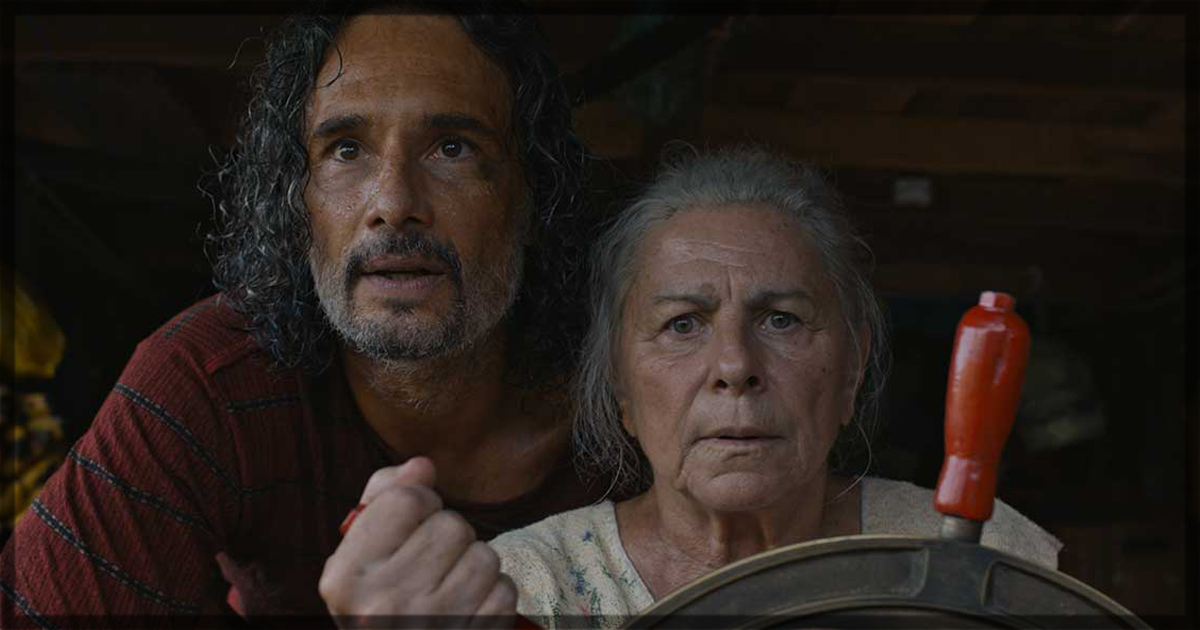One of the central figures of the newest generation of Brazilian cinema, Gabriel Mascaro, is already a well-known name on the international festival circuit. His 2015 film, Neon Bull (Boi Neon), premiered at the Venice Film Festival. His next work, Divine Love (Divino Amor), world premiered at the 2019 Sundance Film Festival and later on the Berlinale Panorama. His latest film, O Último Azul (The Blue Trail), competed at this year’s Berlinale, winning the Silver Bear, the second most significant award of the festival, only behind the Golden Bear. Following acclaim at one of the three most influential festivals, the film is showing in multiple festivals globally, including the Toronto International Film Festival as a Centrepiece.
In his new work, Mascaro portrays a parallel reality where the elderly population becomes a respected element of the Brazilian society. When an individual turns seventy-five years old, they receive a laurel on their house’s porch, indicating the seniority, and a government medal congratulating them on their contribution to the nation’s history. The person’s custody goes to their children, while they must transfer to a colony, where all the elders live together. The film narrates the story of Tereza (Denise Weinberg), a seventy-seven-year-old woman who works in an alligator factory. Suddenly, she gains the laurel and becomes an elder citizen of the state, transferring her custody to her daughter, and losing her autonomy to make choices. Yet, she dreams of going on a plane flight before the colony stay, deciding to escape her daughter and the government to make her dream come true.
Mascaro constructs a country with heavy state control over its elders, who have to obey the rules and forcibly rest. Similar to the director’s latest work, Divino Amor, which tells a dystopian Brazil with a civil servant who offers therapy to couples who are separating. The director is interested in creating an alternative reality of a country with continental size and problems of the same grandeur. In his last work, he discussed the ongoing exponential growth of Pentecostal evangelism and its sexual repression. The director weighs in on the fast-paced aging of the Brazilian population, which has more aging people than newborns.
The filmmaker and Tibério Azul penned a script about the subversive spirit of an elderly individual, whose only wish is to fly on a plane, but she did not need to do so the day before that. The screenwriting duo discusses the contradictory nature of having a forced retirement and lacking the free will to do what you desire. Similarly, the character flips the moral compass by performing rebellious acts, often regarded as the spirit of the youth, popularly misunderstood as irresponsible and reckless. The constant escapes of Tereza have a comical aspect attached to them, once the elders wish to rest and retire from their labor activities. Yet, she wants freedom and flees most ingeniously.
Aside from a fascinating subtext about aging and government control, Mascaro and Azul’s script is thin and episodic. Yet, its simple nature gains new heights due to the marvelous acting of Denise Weinberg, a veteran and occasionally underused actor in the Brazilian dramaturgy. Tereza has a plethora of motives, emotions, and skills to escape the destination the government wants her to go to. For most of the length, Weinberg is alone on the screen. Still, she deliciously shares the screen with Rodrigo Santoro in a segment, where he portrays a boat pilot who transports her clandestinely. The Blue Trail in the title refers to a forest snail that releases a blue discharge, which, when dropped in the eyes, shows the person’s future. In fact, the importance of this magical element is occasional, a mere narrative dispositive to advance the story, and the futuristic visions come from the actor’s dialogues, not in a visually demonstrated form.
Another crucial aspect is the score by Memo Guerra, which emulates esoteric music through a bell and a calm sound. It is almost a meditative hymn that bears Tereza’s journey, mimicking the reflective nature of the Amazon River and the forest. The cinematography by Guillermo Garza composes a contradictory poetry between the character’s freedom and the immensity of possibilities in the Amazon. A beautiful moment is when Tereza is learning how to guide the boat, juxtaposing the sunrise in the river, the score by Guerra, and Garza’s naturalistic camerawork. Amidst the thin and episodic script, which often loses steam in developing its ideas, the cinematography and score broaden that universe visually and sonically.
Thus, Gabriel Mascaro introduces another tale of an alternative Brazil in O Último Azul (The Blue Trail). It is a fascinating concept trapped in a thin narrative arch, but Denise Weinberg provides a spectacular performance as a rebellious older woman. Finally, Memo Guerra provides the odd element of state power compromising individual liberties through his score, which is the best musical work of the year so far.
The Blue Trail (O Último Azul) recently played at the Toronto International Film Festival.
Learn more about the film at the TIFF site for the title.


